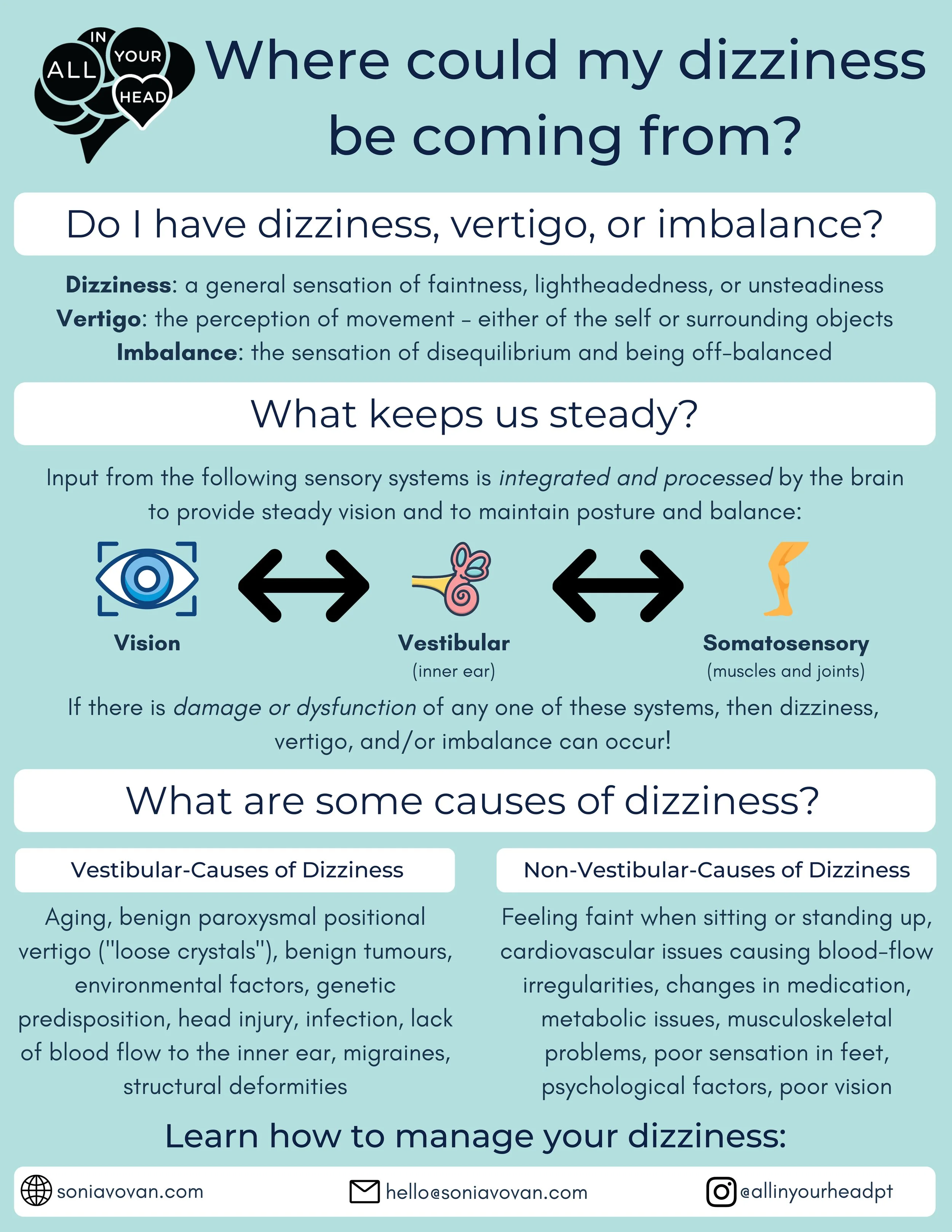What Are Some Causes of Dizziness?
There are many causes of dizziness, so a thorough evaluation is needed to determine the root cause. To make matters more complex, there could be multiple causes of dizziness at play. Furthermore, the term ‘dizziness’ can encompass a wide range of symptoms that have some similarities, but distinct differences. Describing them accurately can mean the difference between a successful diagnosis and treatment, and one that is missed or incorrect.
Dizziness, vertigo, and disequilibrium are often similarly described.
Dizziness
Vertigo
Imbalance
Dizziness
is typically described as a sensation of lightheadedness, faintness, or unsteadiness that does not involve a rotational component.
Vertigo
involves a rotational component, usually involving the perception of movement.
Disequilibrium
involves the sensation of imbalance or loss of equilibrium that is often accompanied by spatial disorientation.
Due to the similarities in how the symptoms are described and the many possible causes of dizziness, getting a correct diagnosis can be a long and frustrating experience.
To simplify the causes of dizziness, we can group them into 2 main categories:
Vestibular Dysfunction:
Vestibular dysfunction is most commonly caused by head injury, aging, and viral infection. Certain illnesses, genetic, and environmental factors can also contribute to vestibular dysfunctions. When there is dysfunction of the vestibular system, dizziness can be a common symptom. Here is a quick (if you consider 2 minutes as quick!) summary of the vestibular system:
Some more common vestibular causes of dizziness include:
Age-related dizziness & imbalance
Benign paroxysmal positional vertigo (BPPV)
Vestibular migraine
Labyrinthitis or vestibular neuritis
Ménière’s disease
Vestibular damage due to head injury
Secondary endolymphatic hydrops
Perilymph fistula
Cervicogenic dizziness
Less common vestibular causes of dizziness include:
Superior canal dehiscence
Acoustic neuroma
Bilateral vestibular hypofunction
Ototoxicity
Neurotoxic vestibulopathy
Enlarged vestibular aqueduct
Mal de Débarquement
Autoimmune inner ear disease
Cholestoatoma
Persistent Postural Perceptual Dizziness (PPPD)
Non-Vestibular-Related Cause:
Non-vestibular-related causes of dizziness can be associated with a wide range of problems:
Aneurysm
Arrhythmia
Dehydration
Heart attack
Medications
Orthostatic hypotension
Stress, tension, or fatigue
Tumours
Vasovagal syndrome
Multiple sensory deficits (i.e. having both a vestibular disorder and visual deficit)
Ultimately, when it comes to vestibular dysfunction, dizziness is usually the body’s response to a mismatch of information coming from the sensory systems. The human balance system is dependent on consistent information from the visual, vestibular, and proprioceptive systems. The information is integrated, processed, and then feedback messages are sent back to the sensory systems to create the appropriate response. However, if there are conflicting forms of sensory information, that is when dizziness occurs!
When it comes to vertigo, there are specific causes and treatments for it that will be discussed in a future post!
What are some ways that Vestibular Rehabilitation can help with dizziness?
Gaze Stabilization Exercises
Gaze stabilization exercises help with dizziness that occurs when the visual world appears to bounce and blur when reading or moving around. These exercises improve the control of eye movements during compensatory head movements so that vision can remain clear and in focus during movement.
Habituation Exercises
Habituation exercises help with dizziness that occurs during self-induced motion or motion that occurs in the environment. These exercises decrease dizziness and improve tolerance to specific motions that induce dizziness (i.e. bending over) or specific visual stimuli (i.e. busy grocery stores).
Balance Training
Balance exercises help with dizziness that occurs when postural control is required to remain steady. These exercises improve steadiness and the ability to navigate a variety of environments that may require varying demands on our balance systems (i.e. turning around, walking in the dark or on uneven surfaces).




